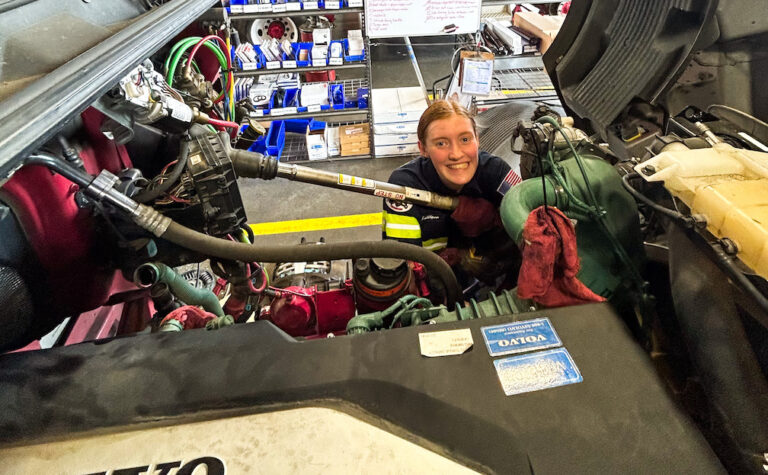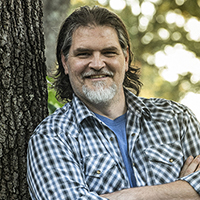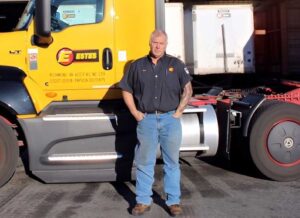If 13-year-old Kaitlynn Aikin could see herself today, as a decorated diesel technician for Southeastern Freight Lines, she wouldn’t believe her eyes.
“My freshman-year self would be astounded,” said Aikin, now 20.
Back then, Aikin had her mind set on a career in law enforcement. However, as a high schooler she took advantage of an opportunity to take an automotive program — and unintentionally discovered her future career.
“I was always interested in mechanical things growing up, and seeing how things worked,” she said. “When I was 16, I thought it would be very fun to attend a trade school class. I fell in love; I did very well in the program, and I took a job at a shop, working in the tire shop and on cars.
“They also had a diesel shop on the same property, and I got to go there and work on boats, excavators, tractors, all the big rigs,” she continued. “It was just very interesting to me.”
Following high school graduation in 2022, Aikin completed a technician training program before joining Southeastern’s Fort Worth service center.
To date, she has yet to share a classroom or workspace with another female, yet she insists she’s never felt any intimidation in the male-dominated field.
“I didn’t find it intimidating at all being the only female. I found it more of a challenge,” she said. “There’s a competition aspect to it; I want to see how good I could be.”
So far, all assessment of the Alabama native runs along the lines of “pretty damn good.” Despite being on the job for just a few months, she landed Southeastern’s award last December.
She’s also blended into her work group with a poise and skill usually reserved for people with many more years under their belt, a fact she struggles to explain.
“Everything about this field just came naturally to me. It’s very intriguing to figure out how something works and why it works and how it can fail,” she said. “Electrical diagnostics is just fun. It’s something that has laws; a circuit can only fail in three ways, for example. After you figure that out, it’s fairly simple from there.
“I just see it as a constant puzzle of understanding how parts go together, how they function and what their purpose is,” she added. “After you understand the basics, it’s a pretty simple understanding of how to diagnose it, which is also very fun because you’re just trying to find the problem.”
One of Aikin’s secret weapons in her job is humility. Despite her recent accolades and recognition, she never turns down the chance to learn or fails to ask more experienced team members for help.
“[At Southeastern] you work with another technician for your first two months. I was actually put under two more experienced technicians,” she said. “They were very helpful with any questions I had, and they showed me the proper procedure to do anything that I had questions on. If they couldn’t answer my question, they would send me to someone else who could explain it.
“That’s been very helpful because where we used to be called mechanics, because we worked on things that are mechanical, we’re now called technicians because we can do anything from electronics to body work on the vehicle,” she continued. “A lot of the systems that used to be mechanically controlled are now electronically actuated. So you have a lot more electronic failures and you have to do a lot more electronic diagnoses.”
Despite her tender age, Aikin has quickly become a role model for other young people in general — and young women and girls in particular — to consider the field of diesel technology.
It is a message that industry is desperate to deliver to prospective workers. Speaking to the Virtual Diesel Expo in 2022, Diesel Laptops founder and CEO Tyler Robertson estimated there were 80,000 open positions for diesel technicians in the U.S., while colleges only produced about 10,000 new technicians for the trade annually.
The U.S. Bureau of Labor Statistics also underscored the scope of the problem, noting that between 2020 and 2030, the industry is expected to add 28,100 openings annually for diesel service technicians and mechanics.
Asked what she would tell a roomful of young people about the industry were she given the opportunity to do so, Aikin’s first advice is to get the facts about a career as a tech.
“I was told growing up that you need a four-year degree to be successful,” she said. “That was never the path that I wanted to take. I didn’t want to go to college for four years and then not use my degree for anything. With trade school, you’re hands-on and you get into the workforce within a year or two after graduating high school. There are plenty of different programs you can go through that teach you and will actually help you accel in using those real-world skills.”
As for the courage to break stereotypes, she said she’d advise any young woman or person of color to embrace such challenges.
“Some things may seem very challenging at first, but whenever you break something down it makes it a lot easier,” she said. “Take things piece by piece instead of trying to take on everything at once, slow down and take a deep breath. It’ll be OK. We all find those things that are challenging to ourselves and working through them is what makes us who we are.”
Dwain Hebda is a freelance journalist, author, editor and storyteller in Little Rock, Arkansas. In addition to The Trucker, his work appears in more than 35 publications across multiple states each year. Hebda’s writing has been awarded by the Society of Professional Journalists and a Finalist in Best Of Arkansas rankings by AY Magazine. He is president of Ya!Mule Wordsmiths, which provides editorial services to publications and companies.








